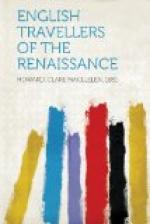“The worlds are chaungde, and men are growne to more wit, and their minds to aspire after more honourable thoughts: they were dunces in diebus illis, they had not the true use of gentility, and therefore they lived meanely and died obscurely: but now mennes capacities are refined. Time hath set a new edge on gentlemen’s humours and they show them as they should be: not like gluttons as their fathers did, in chines of beefe and almes to the poore, but in velvets, satins, cloth of gold, pearle: yea, pearle lace, which scarce Caligula wore on his birthday."[151]
On the whole, we may say that the objections to foreign travel rose from a variety of motives. Ascham doubtless knew genuine cases of young men spoiled by too much liberty, and there were surely many obnoxious boys who bragged of their “foreign vices.” Insular prejudice, jealousy and conservatism, hating foreign influence, drew attention to these bad examples. Lastly, there was another element in the protest against foreign travel, which grew more and more strong towards the end of the reign of Elizabeth and the beginning of James the First’s, the hatred of Italy as the stronghold of the Roman Catholic Church, and fear of the Inquisition. Warnings against the Jesuits are a striking feature of the next group of Instructions to Travellers.
* * * * *
CHAPTER IV
PERILS FOR PROTESTANT TRAVELLERS
The quickening of animosity between Protestants and Catholics in the last quarter of the sixteenth century had a good deal to do with the censure of travel which we have been describing. In their fear and hatred of the Roman Catholic countries, Englishmen viewed with alarm any attractions, intellectual or otherwise, which the Continent had for their sons. They had rather have them forego the advantages of a liberal education than run the risk of falling body and soul into the hands of the Papists. The intense, fierce patriotism which flared up to meet the Spanish Armada almost blighted the genial impulse of travel for study’s sake. It divided the nations again, and took away the common admiration for Italy which had made the young men of the north all rush together there. We can no longer imagine an Englishman like Selling coming to the great Politian at Bologna and grappling him to his heart—“arctissima sibi conjunxit amicum familiaritate,"[152] as the warm humanistic phrase has it. In the seventeenth century Politian would be a “contagious Papist,” using his charm to convert men to Romanism, and Selling would be a “true son of the Church of England,” railing at Politian for his “debauch’d and Popish principles.” The Renaissance had set men travelling to Italy as to the flower of the world. They had scarcely started before the Reformation called it a place of abomination. Lord Burghley, who in Elizabeth’s early days had been so bent on a foreign education for his eldest son, had drilled him in languages and pressed him to go to Italy,[153] at the end of his long life left instructions to his children: “Suffer not thy sonnes to pass the Alps, for they shall learn nothing there but pride, blasphemy, and atheism. And if by travel they get a few broken languages, that shall profit them nothing more than to have one meat served on divers dishes."[154]




